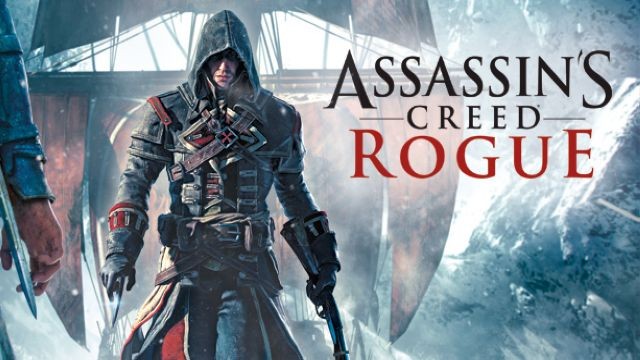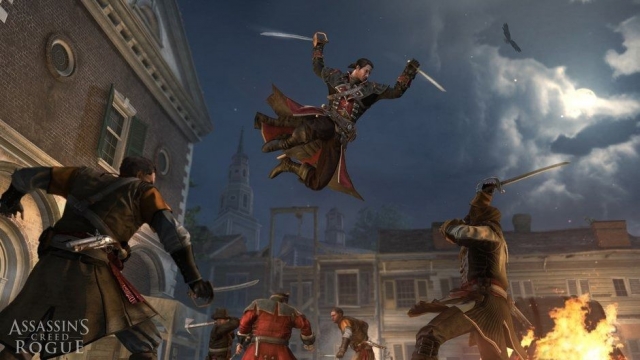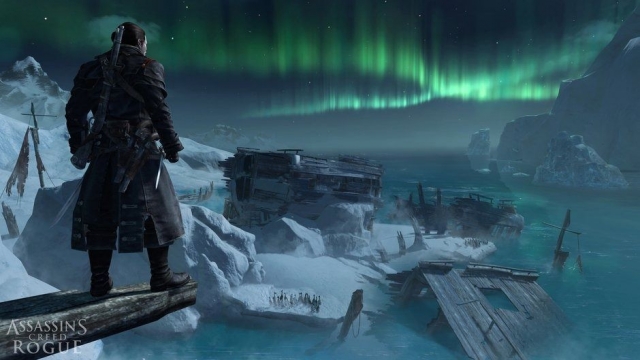Assassin’s Creed: Rogue (PC)

I know this is supposed to be a review of Assassin’s Creed: Rogue. And we’ll get to that, don’t worry. But once I figured out what Rogue was after just a few minutes, I decided to run an experiment: just how bad is Assassin’s Creed Unity compared to Rogue, seeing as how they were both made concurrently. My takeaway? I sincerely hope the next AC leans more towards Rogue than Unity.
The big “hook” of Rogue is that for the first time in the series, you play as a Templar agent. Shay Cormac starts as an Assassin and, through a series of unfortunate events, finds himself on the business-end of his friends’ wrist blades. Throughout the adventure, Shay runs into tons of historical figures and some returning characters from AC 3 (Connor’s story) and AC 4.
Overall, the story is serviceable, but not wonderful. Unlike the character-driven high points of Revelations and Black Flag, Shay’s motivations aren’t quite expanded upon in enough detail or depth to justify the plot turns. A large event sparks Shay’s betrayal of the Assassin Brotherhood, but it’s never very clear how a difference of opinion over immediate goals would turn him from killing Templars to killing Assassins. Especially since the whole time, if they had just sat down and talked for ten minutes, Shay’s concerns could have been addressed.
All of this is to say, it would take a mighty compelling argument to convince a liberty-loving freedom fighter to turn his back on that ideal and embrace the totalitarian controls that the Templar Order espouses. From what I can tell, all it took for Shay to pledge his soul to the Templars was for one of them to be nice to him and listen to his thoughts for a few minutes. Not exactly convincing drama. Rogue is practically masterful when compared to Unity, however, as Arno’s story is incomprehensible and dreadfully boring, which is dumbfounding considering the meaty potential that the French Revolution could have provided to the AC series. Ubisoft takes the best, most on-point historical turning points (the American and French revolutions) that deal directly with the nature of series’ central battle of liberty vs. control, and squanders them, time after time.
I will say that if nothing else, Rogue is a nice “fill in the gaps” piece. No, it’s not exactly an amazing story in its own right, but it paints a tragic portrait of Achilles, Conner’s adoptive father, of how and why he’s in the defeated state you find him in at the start of AC 3. It also nicely sets up the events of Unity, though of course, that game fumbles the ball almost immediately. And finally, though very little “current-day” progress is made back at Abstergo Entertainment, we at least get small glimpses into the larger war. I know I’m in the vast, vast minority on this one, but I think AC suffers from the lack of Desmond Miles, or rather, someone like Desmond, a “backbone” that unites the disparate time periods into a larger narrative arc. Come Unity, there’s almost nothing driving the current-day plot forward, and that leaves the events in history feeling arbitrary and rudderless.
Rogue’s gameplay is an almost exact carbon-copy of Black Flag’s, with a dual sword-wielding protagonist, hopping from island to island on an upgradable sailing ship. If you played Black Flag and you enjoyed it, then this is just another 25 hours of it. A few small additions are present to keep things more in line with playing a Templar – you can now be ambushed by hidden assassins (similar to how adversarial multiplayer worked in previous games). There are also new protection mini-missions, where you have only a few minutes to scour a settlement to find and kill assassins before they launch an attack on a moving Templar agent. And of course, it wouldn’t be an open-world Ubisoft game it there weren’t an obnoxious amount of collectibles to hunt down (i.e. busywork for the compulsively completionists).
I wish there was more to say about Rogue, but there really isn’t. For better or worse, Ubisoft has turned Assassin’s Creed into a fairly predictable series. Rogue is very much a standalone AC 4 expansion. I still maintain that AC’s combat (minus Unity) and freerunning systems are the best third person action mechanics out there and I wish more games imitated them. So for me, I could be content playing knock-off after knock-off. I do fear for the future of the series, though, as while Black Flag and Rogue’s gameplay might be stale at this point, Unity’s departures are headed in a very troubling direction. Rogue was quick and fun and I was a little sad when the main story ended. Juxtapose that to Unity, which I’m going to try finishing this week, after months of it sitting on my harddrive, untouched. I don’t have high hopes.
Reviewed By: Brian Mardiney
Publisher: Ubisoft
Rating: 80%
——————————————————————————–
This review is based on a digital copy of Assassin’s Creed: Rogue for the PC provided by Ubisoft.
 Game Over Online
Game Over Online








